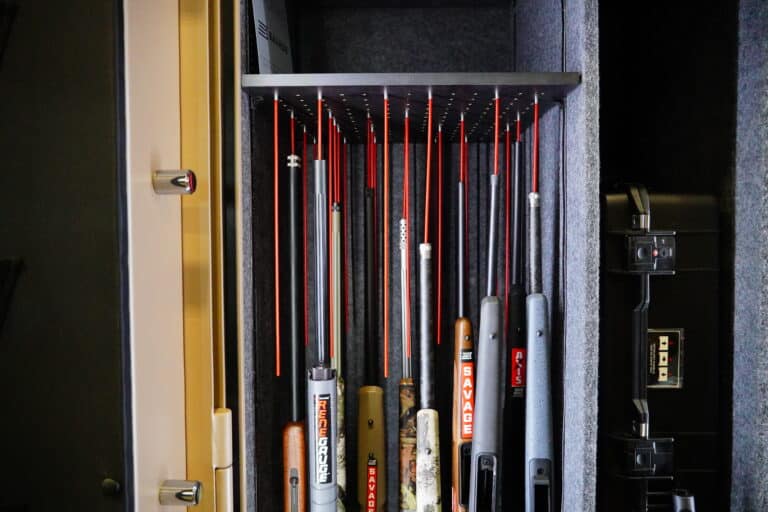Requiring a permit to exercise Second Amendment rights within the home is unconstitutional.
That’s according to Illinois Circuit Court judge T. Scott Webb. On Monday, Webb struck down the state’s requirement that citizens have a Firearm Owner Identification (FOID) card to own a gun in an Illinois woman’s challenge to charges of possessing a .22 caliber rifle without a permit.
“After analyzing all the evidence in this matter, this Court finds that the Defendant’s activity of possessing a firearm within the confines of her home is an act protected by the Second Amendment,” Judge Webb wrote in People of the State of Illinois vs. Vivian Claudine Brown. “Additionally, there are no historical analogues to the FOID Act as required in Bruen. Finally, the Court finds that any fee associated with exercising the core fundamental Constitutional right of armed self-defense within the confines of one’s home violates the Second Amendment.”
The ruling marks the third time over an eight-year saga that the same court has delivered an opinion tossing the Illinois FOID requirements in Brown’s case. In each of the previous decisions, the case has found its way up to the state Supreme Court, where it has punted on making a final decision on the merits. Monday’s ruling tees up yet another state Supreme Court showdown that gun-rights advocates hope will deliver a lasting blow against the permit-to-purchase law.
The Second Amendment Foundation, which joined Brown in her suit, said it was confident in its chances to obtain such an outcome.
“We expect the state to appeal again, which could put the case right back before the Illinois Supreme Court for the third time, and we are confident we will win,” Alan Gottlieb, the group’s founder, said in a statement. “It’s hard to see how the Illinois Supreme Court avoids the constitutional issue, as they have done on the previous two visits.”
Illinois Attorney General Kwame Raoul (D.) did not respond to a request for comment.
The case stems from a 2017 dispute between Brown and her estranged husband. Shortly after the couple separated, Brown’s husband filed a complaint against her, alleging she fired a gun inside their home. Police responded and recovered a .22 caliber bolt-action rifle but found no evidence that it or any other weapon had been fired, according to court records. Despite Brown having no criminal record and being otherwise eligible to possess a firearm, the state charged her with owning the rifle without a FOID card.
In reviewing her challenge to that charge, Judge Webb said that he viewed the fact that the conduct in question took place inside the home as “paramount.”
“The right of self-defense is paramount when one is tucked away in the privacy, comfort, and protection of one’s home,” he wrote, citing the Supreme Court’s 2008 Heller decision. “The need to defend oneself, family, and property is most acute within the home.”
He also rejected the state’s suggestion that the Second Amendment does not cover Brown since she decided not to obtain a FOID card before possessing a rifle, a decision that the state claimed shows “she is not a law-abiding, responsible citizen.”
“That reasoning would exclude every person who fails or refuses to comply with even the most draconian gun legislation from challenging its constitutionality because they would no longer be considered law-abiding citizens,” Webb wrote. “Such reasoning is a fatally flawed attempt to make everyone criminals who refuses to bow their knee to the dictates of the government and kiss its signet ring.”
Turning to historical support for the modern FOID card, the state pointed to early American laws that disarmed categories of people based on perceived dangerousness as an example. However, Webb rejected those comparisons out of hand.
“Frankly, there is no historical analogue to the Act,” he wrote. “Moreover, none of the laws cited by the State as being historically similar sought to disarm otherwise law-abiding citizens within the confines of their own homes.”
Finally, on Brown’s challenge to Illinois’s ten-dollar FOID card processing fee, Webb agreed with the state that it is common to recoup costs related to permits for exercising other constitutional rights, including the First Amendment. However, he said government officials can only apply such a regime to the public exercise of constitutional rights.
“This Court cannot contemplate another Constitutional right where one must pay a fee to exercise it within the safety and privacy of one’s own home,” he wrote.
He ultimately determined that Illinois’ permit-to-possess regime and associated fees, as they apply to private firearm possession within one’s home, cannot stand.
“Specifically, the Court finds 430 ILCS 65/2(a)(l) and 430 ILCS 65/5 unconstitutional on their face and as applied to law-abiding citizens within their home as well as to the Defendant in the case sub judice under the Second Amendment to the United States’ Constitution,” Webb concluded. “This Court cannot reasonably construe the FOID Card Act in a manner that would preserve its validity.”






